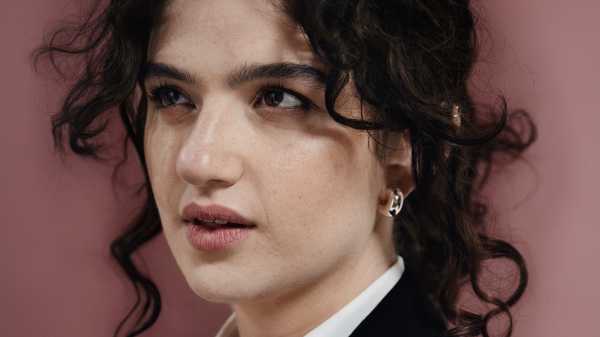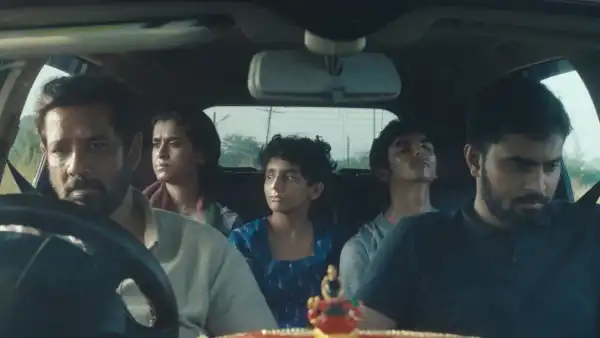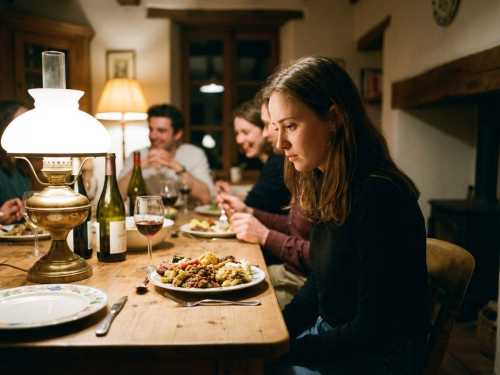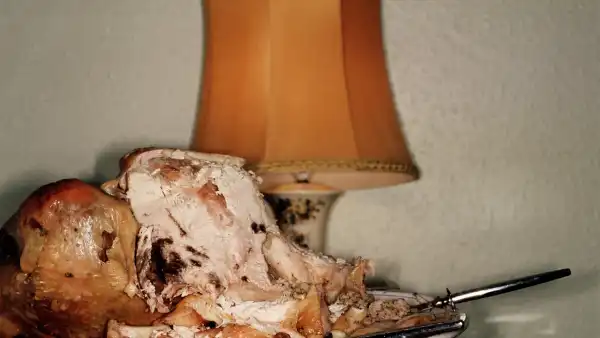
Save this storySave this storySave this storySave this story
The Canadian director Emma Seligman was only twenty-four when she shot her first feature film, the 2020 comedy “Shiva Baby.” In the movie, which is based on a short that Seligman submitted as her thesis project in N.Y.U.’s film program, an adrift college student named Danielle, played by Rachel Sennott, attends a pressure cooker of a shiva for a family member. There, she is forced to simultaneously contend with her pushy Jewish parents, her poised and successful ex-girlfriend, and her hot-and-cold sugar daddy (not to mention his wife and baby). Despite being produced for the relatively minuscule budget of two hundred thousand dollars, “Shiva Baby” gained digital-screening momentum during the pandemic, becoming an audience favorite when it was finally released in theatres in the spring of 2021, and, later in the year, on HBO. (In 2022, the movie won an Independent Spirit John Cassavetes Award.) Seligman, who had returned to her native Toronto to wait out lockdown at her parents’ home and had been taking babysitting jobs to make extra cash, was suddenly indie cinema’s next big hope.
While in the process of developing “Shiva Baby,” Seligman was also co-writing, with Sennott, the queer-teen sex comedy “Bottoms,” which, after the release of “Shiva Baby,” was bought by Orion and shot last year in New Orleans for a multimillion-dollar budget. In the off-kilter, high-jinks-heavy movie, Sennott and Ayo Edebiri play two lesbian teen rejects who forge a plot to seduce their school’s hot cheerleaders by running a fight club for girls. A gay-skewed tribute to teen comedies of the late nineties and early two-thousands like “Bring It On” and “But I’m a Cheerleader,” the very funny “Bottoms” combines campy weirdness with sweet absurdism. On a recent summer afternoon, I met with Seligman, now twenty-eight and back in New York, at the West Village café in which she and Sennott would meet to work on their screenplay for “Bottoms.” We spoke of indie and commercial cinema, male validation, and whether you need to be a dick to be a good director. Our conversation has been edited and condensed.
Growing up in Toronto as a movie-loving kid, were you a pretentious, ambitious teen? Were you, like, “I want to do great things”?
I feel like sometimes I rewrite history a little bit. I want to say that I just loved movies like all my friends loved movies, but then I go back and read old journals where I’m, like, “I’ve got to get to New York,” and I don’t remember that at all. But I wasn’t watching Kubrick movies. It was golden-age-of-Hollywood movies, or “E.T.,” or stuff that was coming out, like “Easy A” or “Nick and Norah’s Infinite Playlist.”
When did you have a sense that you actually wanted to become a filmmaker?
I was part of this high-school group called TIFF Next Wave. It’s twelve kids from across Toronto, and you have your own mini film festival, and through that I was starting to see the curtain pull back a little bit. But I really realized I wanted to get into film when I started directing theatre in high school. In grade twelve, I got to direct a one-act play, and once I started doing that I was, like, Oh, my God, I love being in control and having the space to tell everyone what to do and working with tech and music and sound design.
The experience of being a teen girl is usually somewhat disempowering. So, was having this relative power surprising to you, or were you generally an empowered teen?
I think back to being in high school, and it was awful, in terms of being an emotional young girl and the angst that you feel and the lack of agency and starting to understand how much the world is against you and how much the world hates you as a woman, and really struggling with that information. I was trying in this universal way to fit in. I hated my body—that was the biggest thing, as it is for so many people. I didn’t know how to handle my emotions, and so I thought I was crazy. I didn’t know I was queer. It just sucks—it sucks to be a teen-age girl. It’s really the worst thing. [Laughs.] But I look back, and I know that movies gave me a sense of grounding myself. It was empowering to be, like, I have a thing, and having other people recognize it is validating.
For college, you decided to go to school in the States.
My mom really wanted me to go to film school here because it was just such a passion of mine. She just knew there’d be more opportunity for me. When I was applying to universities, I got into N.Y.U. and U.S.C., and I was, like, O.K., if I go, then this is the time to make the decision that I’m going to pursue this. No matter what family stuff I talk through in therapy or whatever, nothing will ever trump how much my parents have supported me and how grateful I am for that. So many people in our community who probably made more money than my parents thought it was crazy that they were going to send me to the States, especially N.Y.U., which is one of the most expensive schools. I never felt pressure from my parents—“Make sure you make something out of this degree”—but I felt that pressure, and I think that ultimately helped me. I put that pressure on myself.
When did you start working on the short version of “Shiva Baby”?
It was my final-year project.
At that point, were you thinking about models of who you could be like? Like, this is the kind of career that I want, this is the kind of movie I want to make?
I’ve always thought that I’d like to make something like “Aftersun” or “Past Lives,” something so still and pretty, and all that comes out when I’m typing is blah-blah-blah, so much dialogue. [Laughs.] I talk so much, I can’t help it. I was really influenced by Lena Dunham and Joey Soloway. When “Transparent” came out, I’d never seen this kind of honest, dark, Jewish storytelling. And “Girls” premièred when I was in high school, and I think it had a more profound effect on me than I even realized. The way Dunham writes about her neurosis and her body and her weird sexual interactions through Hannah—she changed everything.
When did you meet Rachel Sennott?
I met her when she auditioned for the short. She was a year younger than me, but it didn’t really matter because she was skipping class at N.Y.U. to meet any film kids that she could and do all their weird, little lighting exercises. I saw her face pop up so many times and was, like, She should audition. She had a really good face, she was funny, and she had a vulnerability to her. I shot the short right before I graduated, in April, 2017. It ended up being seven minutes. It was a tiny glimpse of what you see in the feature. It was its own three-act story. Danielle has the interaction with the sugar daddy, her parents are there, he comes, wife comes, baby comes, and she’s, like, Oh, my God. [Laughs.] That’s kind of it.
And then how did it get from the short to what ended up becoming your first feature?
Rachel is so structured and ambitious, and she helped me set goals for writing the script. I learned very quickly that she carried around monthly, one-year, and three-year goals in her backpack, printed out. They helped remind her of what she was working toward. She’s a beast. She went to open mikes every night. I watched her work up the standup ladder in the New York alt scene. And I had a feeling: this is a girl who’s going to hold me accountable to my goals.
I remember we caught up a couple of months after we shot the short, and I told her about wanting to make “Shiva Baby” into a feature and my idea for “Bottoms,” which at that point was, like, I want to do a teen sex comedy for queer girls, and I kind of see you in the more Michael Cera role, and do you know that girl Ayo Edebiri? I didn’t know her well, but I met her at a party and found out that she and Rachel were friends. I thought that if I ever made that movie she’d be so perfect in that role because she’s so awkward and sweet and had such a slapstick sense of humor. And Rachel took out a big agenda, a planner, and was, like, So, we should meet up once a week and we’ll work on “Bottoms,” and you’ll come to me with “Shiva” pages? That was all it took. You have to do that thing where you’re, like, It’s gonna happen—we’re going to make these actual movies. We didn’t have a model in terms of what we were trying to do, which is kind of crazy, but it just takes two crazy people, you know what I mean? To just be, like, Let’s do it, let’s spend all our time in this café. [Laughs.]
And your decision to make “Shiva Baby” about a girl who is dealing with issues of male validation, searching sexual identity, and sex work, and the relationship to the pressures of family . . . Is it just all stuff that came from your own life?
I think that the search for male validation was something that I was feeling. The desperation and the pain that was caused from not receiving that validation—I felt it so much in college, and it was the first time I’d ever felt that way. In high school, I’d felt incredibly lonely and insecure about my body, but I wasn’t dating or having sex. I was hoping for that and wanting that, but I just felt like such a loser and that no guy would ever be interested in me, etc., etc. And then in college I started having relations [laughs] and got so confident as a result of that, but it was a false confidence. I was, like, I’m doing it, I’m “Sex and the City” . . . and my mom, too, was always, like, “Have fun,” “Don’t get married,” “Live your life,” “Be an independent woman,” “Don’t have feelings.”
It was the promise of third-wave feminism.
But digested by me through popular-media representations in a way that just felt just as patriarchal in that I was so . . . I was feeling so much. And the “Shiva” short was all about that. I didn’t have the experience with a sugar daddy but I had a fuckboy throughout college that made me feel so awful, and I didn’t even—I don’t know looking back if I was actually in love with him, but I would tell my friends, “I’m in love with him,” and he’d give a little bit and pull away, and give a little and pull away, as fuckboys do, and his validation meant everything. And I couldn’t handle not having it and it drove me insane, and, in the moment, I remember feeling, like, This is insane. I feel so awful right now from this one dude.
And I’m supposed to feel so great.
Yeah, I’m supposed to feel like I own him. I think that there were moments where I would feel really empowered because I felt that he wanted me more than I wanted him, and then I would act on that power by seeing him and then would immediately lose it. So I think I was thinking a lot about that when I was developing the short. Also, at the point when I was making the short, I had tried sugaring once, and I just thought it was so funny that it was such a huge part of the culture at N.Y.U., and yet, any time I told a parent or something, their mind was blown at the fact that this was happening. It’s not like all my friends were doing it, but I knew a couple of girls and everybody knew about it, even if they weren’t doing it. And I was thinking about “Transparent” and how sexual that show is and how it’s about the intersection of sex and family. So I was, like, Oh, this will be really awkward if she runs into her sugar daddy, and it’s sex and family colliding—what an awkward little setup. And then as I was developing it I was like, Oh, this is a little bit more personal than I thought it would be, in terms of talking about sexual power-play dynamics.
The movie also has a queer arc—Danielle is still hung up on her ex-girlfriend, Maya.
There were certainly friendships I had in high school that could have developed into the kind of relationship that Maya and Danielle had. And by the time I was writing the short I’d come out as queer, and I was thinking about having an ex to play off, who can give the audience a bit of intel about who Danielle is and what she’s like on an internal level, and then it was my professor’s idea to have the character also be a foil for all the things Danielle isn’t in this community, because I also wanted to show the amount of angst that she had about succeeding and being a good kid her parents weren’t disappointed in, and show the insecurities that come from comparing children in your community, one who’s going to law school and one who doesn’t know what the fuck they’re doing, and I kept worrying that I was gonna become the fuckup. I felt like as a film major I was really worried on their behalf that they’d have to be, like, Yeah, she’s babysitting, she’s figuring it out, but you know, she wants to make her indie.
When you started developing the feature, how did you go about getting funding?
It was a two-year sprint with two of my friends, Katie Schiller and Kieran Altmann, who went to school with me and were producers. We had a script and a lookbook and a budget of two hundred thousand, which is what it ended up being. Then we brought our third producer, Lizzie Shapiro, on, and she changed the game by being, like, Ask anyone you’ve ever met for a thousand dollars, or five thousand dollars. It was eat, sleep, get money for the movie.
And you were twenty-three at this point?
I was twenty-four.
Were you shaking in your boots to lead a production? Most of the actors and crew were much older than you. Did you know what you were doing?
I remember having a panic attack the night before we started shooting. I just remember very clearly sitting on the floor under the production-office desk and feeling, like, We got all these people together, we got all this money, we got this cast, and there’s no way I can do this. I wasn’t even thinking about my age. I was, like, I just don’t know how to do this. And I called my friend Annie Attanasio, who at that point had directed her first movie, “Mickey and the Bear,” and I was, like, “I can’t do this.” And she was, like, “Everyone is there because they believe in you. They don’t need to be there.” But that just made me feel worse. [Laughs.] I was, like, They shouldn’t believe in me, I’m totally a fraud. And then I went home and didn’t sleep. I watched this short documentary called “DICKS: Do You Need to Be One to Be a Successful Leader?”
Do you have to be a dick to be a good director?
Karyn Kusama, who’s the only female director interviewed in the doc, says that as a female director you’re not really allowed to be a dick, but you have to be firm. But I find now that being firm as a female director means you’re a dick. You have to be O.K. with being called a dick for your actions as a director. You have to get over people saying you’re an asshole.
Is that hard for you?
Yeah. It was really hard on “Bottoms.” “Shiva” was such a small movie. It wasn’t an easy movie to make, but it was an easy movie to prep for: one location, minimal cast, no special effects, no stunts, a script that at that point I had been developing for three years. I definitely felt impostor syndrome and I was nervous, but “Bottoms” was a much bigger production where I was constantly aware of the two hundred people or more who were around me. It was a two-hundred-person crew, and two hundred extras, depending on the day, and an eleven-and-a-half-million-dollar budget for a six-week shoot. So I was shaking in my boots every moment of every day, just sustained panic.
I remember my producer saying something like “If you write a good script, and you have a good cast, and you prep with your D.P. and your production designer, the work’s kind of done, and you shouldn’t have a lot to stress about at that point.” So all I could stress about was, Do people like me? I’m young, I’m a woman, am I a real director? Do they think I’m a bitch? And I felt that every day on “Bottoms,” for sure. It was just impossible for me not to. There were so many people, and so much of it was in my head.
How did you get over it?
I didn’t, really, and it sucked. Jason Reitman has become a mentor, and I would call him often and he’d be, like, “Yeah, if you’re having a panic attack and you think you’re gonna die, that’s normal.” And Elizabeth Banks was my biggest mentor because she was one of our producers, and she’s a director, and she’s made “Charlie’s Angels” on an insane budget and has been in a gazillion comedies, and knew intimately what I was going through. And it was helpful to hear that from people who had so much experience but also hard—that all the feelings I was feeling, I could expect to feel forever.
You were writing “Bottoms” with Rachel as you were prepping for “Shiva Baby.” How did you come up with the idea of girls doing a fight club?
We knew we wanted girls fighting in some way or being superheroes. And we loved movies, like “Kick-Ass” and “Scott Pilgrim vs. the World,” that had an element of adventure or fighting to win the girl. We wanted to give the protagonists heroes’ journeys to make them feel powerful and hot and cool.
But, to go back to the disappointment with empowerment that seemingly comes from being hot and driving guys crazy—“Bottoms” seems to be offering something different.
We didn’t start out thinking deeply about any point we wanted to make. We did know we wanted the leads to be shitty, horny, queer girls. There might have been some part of me that was, like, I want these girls to feel empowered because I wasn’t empowered in high school, I wasn’t out, and I’m course-correcting. All I wanted to see was queer girls in this teen sex comedy that I wish I could have had.
Does it feel strange to you that you’re such a young success story? Or does it feel natural?
I don’t know. It feels both. It feels natural because I’ve wanted this for so long and because part of being a success and being able to call yourself a filmmaker is making money and being able to finance your career from your art. I wasn’t going to keep living in my parents’ house making indies—that’s not what I wanted. There’s nothing wrong with that or with being a babysitter, but the version of success I wanted to reach as soon as possible was to make a movie where people were paying me to make a movie and being able to continue to make movies. So part of me is, like, Wait, this is what I wanted, this is natural. And then in other ways it feels really strange because—I don’t know why, it just does. It wasn’t that long ago that I was at N.Y.U. ♦
Sourse: newyorker.com






